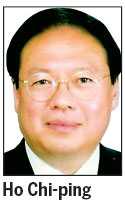Australia 'biting the hand' of China
Updated: 2013-07-04 05:53
By Ho Chi-ping(HK Edition)
|
|||||||
A recent survey by the Lowy Research Institute in Sydney has cast light on an extraordinary contradiction in how Australians apparently view China, which buys 15 percent of their exports and is their biggest customer.
In spite of this, 41 percent of those polled thought it was likely that China would become a "military threat" to Australia in the next 20 years! Factors influencing respondents into this self-contradictory conclusion included ongoing media hype over China's involvement in territorial disputes in the South China Sea, plus China's supposed international cyber hacking - since dramatically negated by former National Security Agency analyst Edward Snowden's revelations about the United States being the guilty party.
On top of this, 57 percent believed Australia was allowing "too much investment from China". Obviously, few bothered to check the facts before expressing such negative opinions. The latest statistics show Chinese investment in Australia now stands at just 3 percent of the total of direct foreign investment in the country, and that China is ninth on the list of direct foreign investors in Australia.
How did Australians get such a horribly skewed views regarding China? For the source of such rubbish, we need only look at the Australian media, which makes headline news out of any Chinese territorial claims, however justifiable, and closely follows all Chinese investments it can uncover. Apparently, the explanation is that "it sells papers and improves ratings". Yes, but what of the damage it does to relations between Beijing and Canberra?
If all this isn't harmful enough, let us now turn to a subject that Australians are still more sensitive about - ownership of Australian farmland. No fewer than 81 percent of respondents said they were opposed to allowing "any foreign country" being allowed to buy Australian farmland.

Alex Oliver, who directed the Lowy survey, said the issue of who should own Australian farmland "hits right at the identity of Australia as a farming nation, an agricultural power harking back to its wool and beef trade." Kerry Brown, executive director of the China Studies Center at the University of Sydney, supplemented: "These concerns about Chinese companies buying into the Australian agricultural sector are valid inasmuch as Chinese companies must do more themselves to shift these misunderstandings and misconceptions about their ownership."
Also, to show the actual situation in a clearer light, the Australian headquarters of the international accountancy giant, KPMG, brought out a report in March titled "Demystifying Chinese Investment in Australia." It clearly shows that most overseas investment in Australia is involved with mining, natural gas and energy, though it found that secondary investment is following a global trend by diversifying into Australian agriculture and real estate.
These highly disturbing findings of the survey suggest that - if the respondents truly represent current thinking across the country - Australians are still living back in the 1960s, when the White Australia policy was still being used to bar Asians from entry as migrants.
The poll was done about the time that Australia was reading in the press and watching on TV supposedly "reliable reports" that Chinese hackers had stolen the plans for Australia's new security headquarters in Canberra. This multi-storey complex in Australia's national capital will itself eventually house an extended staff of computer geeks, but what their specific duties will remain to be seen. One thing is certain - Australians would never tolerate US-style mass eavesdropping on their computer and phone communications, nor would the 142 foreign embassies located in Canberra.
No doubt these "scare stories" about Chinese hacking of Australian institutions and individuals explain why the Chinese telecommunications giant Huawei was banned from tendering for government contracts for Australia's National Broadband Network - yet another unjustified slap in the face for Beijing.
Meanwhile, there has just been a change of personnel in Australia's top job. Former Prime Minister Kevin Rudd has just regained his old post. A fluent Mandarin speaker, Rudd should quickly set in motion measures to rectify many of the grossly inaccurate Australian impressions of China. At risk is no less than A$110.5 billion ($100.3 billion) in annual exports to China of coal and iron ore and concentrates - plus, of course, the Chinese goodwill Australia presently enjoys.
The author is vice-chairman and secretary-general of the China Energy Fund Committee, an independent think tank on China and energy-related issues.
(HK Edition 07/04/2013 page9)